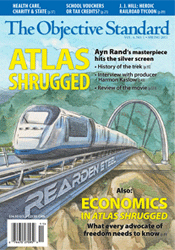(Published in Free Enterprise Vol. 1 Issue. 2 2010)
Paul Hsieh, MD, is a co-founder of Freedom and Individual Rights in Medicine or FIRM, a project which promotes and educates Americans about free market health care reforms. He is also a practicing physician in the Denver, Colorado area.
His writings have appeared in prominent publications such as: The Objective Standard, PajamasMedia, the Christian Science Monitor, the Washington Examiner, the Denver Post, and Capitalism Magazine.
Joshua Lipana: President Obama’s Healthcare plan, widely called as ObamaCare, has recently passed and has now officially become law. How is the passage of ObamaCare going to affect you and the healthcare industry?
Paul Hsieh: Much of the current discussion of ObamaCare has centered on new regulations over the health insurance industry as well as the highly-controversial “individual mandate” requiring individuals to purchase health insurance.
But for doctors, one of the most important (and least recognized) aspects of ObamaCare is that the government will gradually start imposing controls on how doctors can practice.
Physicians will be increasingly subject to various government “comparative effectiveness” practice guidelines that will specify what sorts of procedures and tests they should (or should not) perform, and what sorts of medications they can (or cannot) prescribe.
These measures will be portrayed by government officials as ways of improving quality while reducing costs. But over time, they will also be used as a way to covertly ration medical services.
JL: Does ObamaCare have any redeeming qualities? Is there anything in it that’s good?
PH: Unfortunately, not. The ObamaCare plan is based on drastically increasing the degree of government control over medical practice and medical financing decisions that should instead be made by patients, doctors, and insurers in a free market. By depriving individuals of this freedom, the plan destroys any possible redeeming qualities.
Just as an example — suppose it were scientifically proven that eating carrots was good for you. Then, the government decided to require that everyone eat 3 carrots a day.
Such a law would restrict man’s freedom to act on his own rational judgment — which is our basic means of survival. A government which tramples on our basic freedoms in order to achieve a derivative value (such as “guaranteed” health care) destroys the source of all such values — namely, the rational mind capable of acting on its own independent judgment.
To paraphrase Benjamin Franklin, “They who would give up an essential liberty for temporary health security, deserve neither liberty or security.” And under ObamaCare, we’ll end up with neither.
JL: Prior to the passage of the bill, “Death Panels” were mentioned a lot by the various news outlets in America with regards to the ObamaCare plan. Can you explain to us what the issue was all about? What are these “Death Panels”?
PH: During the 2009 health care debate, some conservatives like Sarah Palin claimed that government “death panels” would decide which patients would live or die under ObamaCare.
Although many ObamaCare supporters called such concerns “paranoia”, after the law was passed they sang a different tune.
For instance, David Leonhardt praised the fact that under ObamaCare the government would finally be able to control health care costs by saying “no” to patients (“The Power Of No”, New York Times, 6 April 2010).
Similarly, President Obama’s nominee to head Medicare, Dr. Donald Berwick, has repeatedly praised Great Britain’s National Health Service as a model for the US to emulate because it rations care in a way he finds socially desirable.
Whether you wish to call them “death panels” or not, it is true that that newly-created bureaucracies such as the Independent Payment Advisory Panel will be empowered to decide if certain procedures and treatments cost “too much” — and therefore not covered under government programs such as Medicare. If you’re a Medicare patient dependent on the federal government for your health care, then this could amount to the government deciding whether you’ll live or die.
JL: Finally; there’s been a lot of talks in the News-media about the possibility of repealing ObamaCare in the future, could you comment on the overall efforts to repeal ObamaCare?
PH: Polls have consistently shown that most Americans want to repeal ObamaCare. The recent anti-ObamaCare referendum in Missouri, the progress of the anti-ObamaCare lawsuit in Virginia, and similar efforts in other states (including my own state of Colorado) shows that the opposition to this health care law is broad and deep.
Some Republicans understand this and want to use legislative measures to “defund” the program now, then later repeal it. Other Republicans are not yet that bold, even though they should be. If they did so, they would have the support of the American people — precisely because they would be fighting for core American values of freedom and individual liberty. The people understand that this is the real issue. Let’s hope that our politicians start understanding this as well.
JL: Thank you very much for your time Dr. Hsieh. This has been a very enlightening interview.



Thank you, Joshua, for that interview! And thank you for everything you are doing to spread good ideas, both in the Phillippines and across the world.
Thanks Paul! This was a great, straightforward interview. Anyone who’s confused about what Obama’s healthcare bill is all about will find your insights extremely helpful.
Pingback: The Little Things · Objectivist Round Up #170